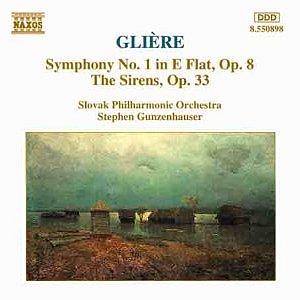What a lovely, melodious, sunny
and cheerful symphony.
For those who like
comparisons, Rimsky-Korsakov comes to
mind. Glière is not a Tchaikovsky
... thank goodness. Glière's
music is unpretentious, colourful, happy
but not superficial. Themes abound and
what good tunes they are ... memorable,
catchy and evocative..., but never silly
or trite. The orchestration is magical,
never extreme or overpowering. His music
is essentially Russian but not in the
bombastic Tchaikovskian style. What
a relief that is! As someone once said,
"Tchaikovsky was the composer of grand,
grand light music.' But that is not
intended to "knock" him. Laying aside
the ballet scores, he was often a fine
orchestrator.
But Glière is
not into anything excessive. He is concerned
with good music and is an exemplar of
the truth that simplicity makes the
best effects in music and not the grand
empty gestures that Tchaikovsky, Mahler
and Elgar often displayed.
Glière was of
Belgian descent and born in Kiev in
1875. His father made wind instruments
and young Reinhold learned the violin.
He went to the Kiev University from
1891 to 1894 before going up to the
Moscow Conservatory where, among his
teachers were Taneyev, Arensky and Ippolitov-Ivanov.
Between 1902-3 he taught Prokofiev and
then went to Berlin to study conducting.
Prokofiev's Piano Concerto no.1 was
premiered by the composer under Glière
in 1916. For twenty years (1920-41)
Glière taught at the Moscow Conservatory
and took a great interest in folk music
of various parts of Russia. He died
in 1956.
Unlike Prokofiev, Shostakovich
and the admirable Myaskovsky, Glière
did not have any "run-ins' with the
Soviet authorities and was not denounced.
His music owes more to the romantic
tradition rather than the advanced or
non-nationalistic styles which the Soviet
regime rejected.
His ballet scores,
The Red Poppy and The Bronze
Horseman are decidedly popular and
do not suffer from that rather disconcerting
effeminacy that you sometimes encounter
in the ballets of Tchaikovsky. Again
this is not a swipe at Tchaikovsky,
merely a comparison. Glière's
ballets while extensive, do not linger
or indulge. Tchaikovskv is more dramatic
as seen in his best scores such as the
Piano Concerto no. 2 (1880) the
Fantasy Overture Hamlet (1888),
Voyevoda (1891) and the earlier
String Quartet no. 3 in E flat minor
(1876), superb scores, all of them.
His operas, particularly Eugene Onegin
are probably his best work and his
songs are exquisite. I wish someone
would undertake to record them all.
But Glière is
far more impressive than Tchaikovsky.
As with Mozart, Glière
knew that to express something most
effectively was in simplicity and not
by repetitiveness or with the use of
a sledge-hammer.
His Symphony No
1 was begun in 1899 while he was
still a student at the Moscow Conservatory
and completed the following year when
he graduated. The first movement begins
with an andante before entering the
allegro. It is warm, encouraging, tuneful
music beautifully written and scored.
The colours are simply magical. There
is a joyful old-fashioned scherzo which
is also hugely enjoyable. The slow movement
is lyrical and extremely lovely. Yes,
it is old-fashioned but none the worst
for that. The finale heads towards a
stirring conclusion. The whole symphony
is soul-satisfying.
Gorgeous music. That type of music that
makes you feel really good! Evocative,
too. The sort of music you associate
with a sunny but not hot day when you
can walk or sit quietly in the country
and enjoy the peace and solitude and
those things that money cannot buy.
The same feelings that Chausson's Piano
Quartet in A summed up for me in
a recent review.
While I love modern
and innovative music (I was sorry that
a reviewer tore Wolfgang Rihm to shreds
recently) this music has a quality one
cannot quite describe.
Eight years after the
symphony came the Symphonic Poem:
The Sirens, a picture of those seductive
women that lured sailors to their doom.
This symphonic portrait is very good
with an eventual climax. There is no
excess, no musical madness, just honest
and gratifying music.
I have, however, heard
both works in better performances. But
these are good and have no awful blots.
The sound is quite good too.
A bargain for a really
choice symphony. This is one to buy!
David Wright
